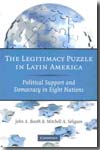The legitimacy puzzle in Latin America
political support and democracy in eight nations
- ISBN: 9780521734202
- Editorial: Fundación Alternativas
- Fecha de la edición: 2009
- Lugar de la edición: Cambridge. Reino Unido
- Encuadernación: Rústica
- Medidas: 23 cm
- Nº Pág.: 355
- Idiomas: Inglés

Political scientists for more than two decades have worried about declining levels of citizens# support for their regimes (legitimacy) but have failed to empirically link this decline to the survival or breakdown of democracy. This apparent paradox is the #legitimacy puzzle,# which this book addresses by examining political legitimacy#s structure, sources, and effects. With exhaustive empirical analysis of high-quality survey data from eight Latin American nations, it confirms that legitimacy exists as multiple, distinct dimensions. It finds that one#s position in society, education, knowledge, information, and experiences shape legitimacy norms. Contrary to expectations, however, citizens who are unhappy with their government#s performance do not drop out of politics or resort mainly to destabilizing protest. Rather, the disaffected citizens of these Latin American democracies participate at high rates in conventional politics and in such alternative arenas as communal improvement and civil society. And despite regime performance problems, citizen support for democracy remains high. These findings resolve the puzzle # citizen actions and values, even among the disaffected, likely strengthen rather than weaken democratic governments. John A. Booth is Regents Professor of Political Science at the University of North Texas. In addition to his four coedited volumes and fourteen articles and chapters with this study#s coauthor, Mitchell A. Seligson, he is the author of Understanding Central America: Global Forces, Rebellion, and Change (fourth edition 2006, coauthored with Christine J. Wade and Thomas W. Walker); Costa Rica: Quest for Democracy (1998); and The End and the Beginning: The Nicaraguan Revolution (second edition 1985). He has published articles in a wide array of scholarly journals in the United States and Latin America, was an associate editor of International Studies Quarterly (2003#2008), and serves on the editorial board of Latin American Politics and So






